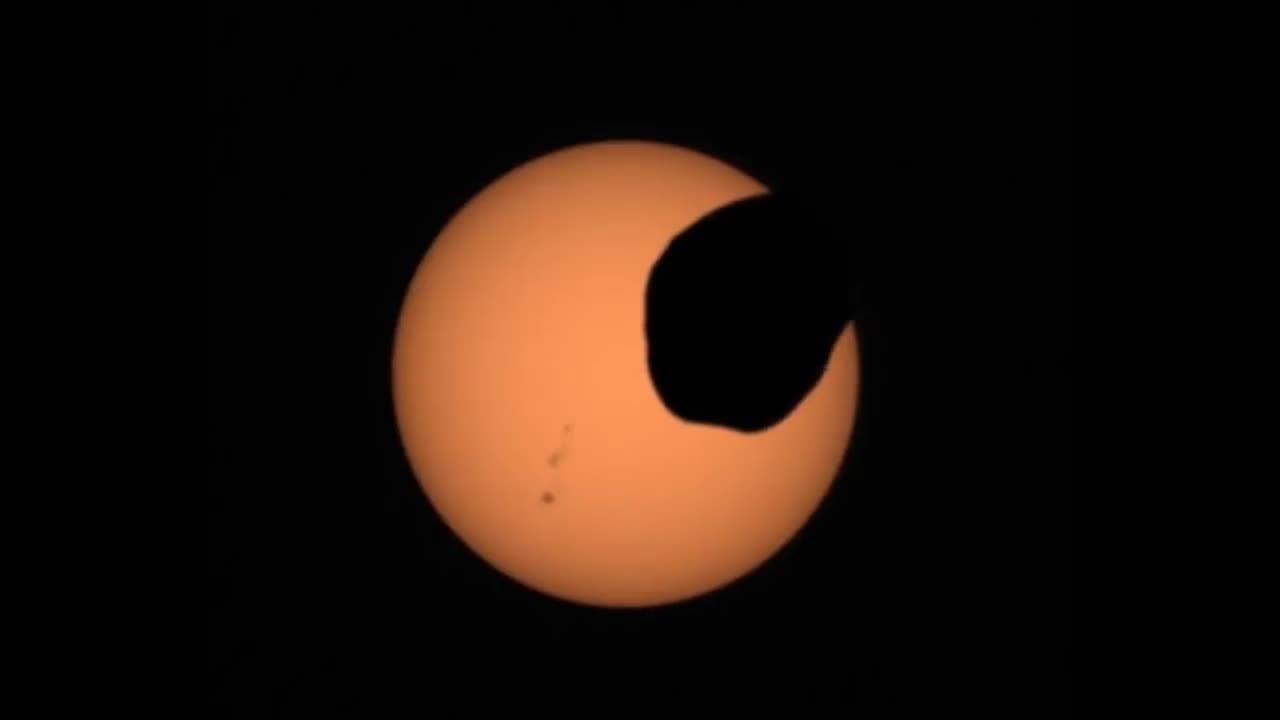Premium Only Content

NASA's Perseverance Rover Sees Solar Eclipse on Mars
NASA's Perseverance Rover, a robotic explorer on the Martian surface, recently captured a mesmerizing celestial event - a solar eclipse on Mars. This extraordinary phenomenon unfolded in the vast, rusty landscapes of the Red Planet, providing scientists and space enthusiasts with a unique glimpse into the Martian skies.
As the rover diligently conducts scientific experiments and explores its surroundings, it also serves as an inadvertent celestial photographer, capturing moments of cosmic significance. The solar eclipse witnessed by Perseverance adds to the collection of stunning visuals beamed back to Earth, showcasing the dynamic nature of the Martian environment.
The event occurred when Phobos, one of Mars' two moons, partially obscured the Sun, casting a temporary shadow on the Martian surface. Perseverance's Mastcam-Z, a high-resolution camera system, seized the opportunity to document this celestial alignment. The resulting images not only offer a visual spectacle but also provide valuable scientific data for researchers studying the Martian atmosphere and the interactions between its moons and the Sun.
This solar eclipse holds particular significance as it sheds light on the atmospheric conditions and astronomical events unique to Mars. Understanding these phenomena contributes to our broader comprehension of planetary atmospheres, helping scientists draw parallels and distinctions between Earth and its neighboring planets.
NASA's Perseverance Rover continues to demonstrate its resilience and scientific prowess, unraveling the mysteries of Mars one discovery at a time. As it embarks on its mission to explore the Jezero Crater, the rover not only seeks signs of past life but also captures celestial moments that deepen our appreciation for the marvels of the Martian cosmos. The images of the solar eclipse serve as a reminder of the rover's dual role, not only as a cutting-edge scientific instrument but also as a cosmic observer, bringing the wonders of the Martian skies closer to our own.
-
 2:14:47
2:14:47
Flyover Conservatives
1 day agoSatan’s Agenda vs. God’s Timeline: Witchcraft, Israel, and the Assassination of Charlie Kirk w/ Robin D. Bullock and Amanda Grace | FOC Show
48.3K10 -
 3:14:57
3:14:57
PandaSub2000
5 days agoBye Sweet Carole | MIDNIGHT ADVENTURE CLUB (Original Live Version)
34.2K1 -
 1:22:51
1:22:51
Glenn Greenwald
10 hours agoThe Irony of John Bolton's Classified Docs Indictment; Prominent Dems Now Stutter When Asked About AIPAC; Celebs in Saudi Arabia Controversy: What Does it Reveal? | SYSTEM UPDATE #532
96.8K56 -
 39:25
39:25
Donald Trump Jr.
8 hours agoFBI's Incredible Crime Crackdown, Plus my Message to ABC!! | TRIGGERED Ep.283
151K113 -
 2:53:38
2:53:38
BigTallRedneck
7 hours agoPGA 2K25 - REDNECK'S WAY OR THE HIGHWAY
16.7K1 -
 2:43:58
2:43:58
megimu32
6 hours agoON THE SUBJECT: MTV | From 24/7 Music to… Silence?
11.6K6 -
 4:38:09
4:38:09
Reolock
7 hours agoWoW Classic Hardcore | More Ultra? Maybe Mage?
7.57K -
 1:02:05
1:02:05
BonginoReport
9 hours agoMusic Stars Go Viral For Anti-ICE Rants - Nightly Scroll w/ Hayley Caronia (Ep.157)
77.9K44 -
 3:57:04
3:57:04
Amish Zaku
8 hours agoBaldur's Gate 3 - Four Player Co-op Act 3
4.06K -
 3:18:36
3:18:36
Barry Cunningham
7 hours agoKINDA BREAKING NEWS! JOHN BOLTON HAS BEEN INDICTED! WHO'S NEXT!
36.9K27